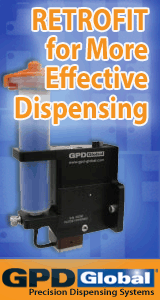Niedernhall, 2009, August 4 – PCB expert Würth Elektronik’s printed pulse resistors achieved the till now claimed impossible high-voltage range of 200,000 V. That has been realised once more by the Würth Elektronik-owned “smart-conductive polymer thick film systems”, outstanding due to a wide variability of resistances. A resistance even to extremely high field strength during realtime operation is now approved. Consequently, printed resistors by Würth Elektronik are outclassing conventionally assembled components, especially wired versions, in any important aspect, thus offering new fields of application. They substitute expensive ceramic resistors and providing for more robust and much cost-effective solutions.
Würth Elektronik’s printed pulse resistors’ reason of success is their capability for assimilating quite high KW-load required for milliseconds, thus for the replacement of expensive ceramic resistors. In comparison with conventionally mounted resistors, the printed resistors’ primary advantage is the high integration potential and consequently reduced volume, resulting in more robust and cost-effective components. In many cases, conventionally mounted components are available only as a wired version, resulting in complex assembly and not reliable solder joints. Not to forget: wired pulse resistors are much larger than standard resistors, need a lot of space and enhanced production efforts, cause much higher costs for procurement and storage and keep the failure risk at the solder joint wires. Würth Elektronik’s printed pulse resistors challenge all these inadequacies. They can be even printed on a multilayer boards’ inner layer, hence they do not occupy rich space on the external layers. Another benefit is their high reliability at high level of thermo cycles. This is approved due to temperature cycle tests (-40 °C / +125 °C, up to 3,000 cycles). Conventional solder joints will fail much earlier under those conditions. Printed resistors are without solder joint, consequently never affected by soldering defects. Standard resistors for pull up/-down applications can be printed in a controlled process at a tolerance range of ± 30 %. For higher grade applications, the resistors tolerance is reduced to a range of ± 5 % over their entire life cycle, even under extreme climate conditions (40°C / 92% rH / 1000 h).
In addition polymer thick film systems with a non-linear positive temperature coefficient allow the realising of heating surfaces. The self-regulating due to the resistor characteristic, achieves a nearly constant temperature level of up to 60°.
Würth Elektronik’s approach by mathematical model and Design-Rules
„All pulse resistors, we had calculated from the past until today with our secret in-house mathematical model, worked perfectly“, says Frank Dietrich, Head of the division FLATcomp Systems at Würth Elektronik. To get their successful solutions accordingly, customers simply have to fill in the design Rules in the website http://www.we-online.com/FLATcomp.
The way to the comfortable and promising solution had been quite logical. Normal power resistors become hot and need large cooling areas. For example, it takes a Heatsink area of 10 cm x 5 cm for 10 W powers. For power resistors, resistant to 25 KW only for two milliseconds, an Aluminium Heatsink would not be helpful. And yes, there is no need for it. High power within such short time does not mean too much energy. That makes things easier. Transferring theory into a matching mathematical formula and to understand the real effect of 25 KW during two milliseconds on the thick film coating in real life - was a real challenge. As Würth Elektronik created a calculation model for that purpose, we discovered that our pulse resistant conductive polymer excellently matches to such a special requirement. The multifunctional thick film system absorbs electric energy by transforming it into heat. „To describe it in simple words, we calculate the volume subject to heating to a size ensuring that 170°C will not be exceeded“, explains Frank Dietrich. In practice, the customer supplies data to Würth Elektronik, these data are being entered into the mathematical model, calculating length, width and thickness of the pulse resistance. In order to avoid fusing the correctly calculated resistor, the right process engineering for thick film technology must be added to mathematics. Such a high pulse through the thick film might induce so-called “hot spots” in inhomogeneous areas. That leads to burn out due to diminutive inhomogeneity.
Finally, we have to take into account that high energy also means high field strength in most cases, originating for various reasons. One reason is net-interferences, known as surge- or burst- pulses, which are destructive for the electronic. Würth Elektronik’s pulse resistors are proactive by energy absorption. This may substitute varistors and other cost-intensive semiconductor elements.
Customer tests in all voltage ranges were passed successfully
Pulse resistors, printed on the basis of Würth’s polymer thick film survived the test in customer applications of all three voltage ranges - low, normal and high voltage.
For low voltage, a pulse resistor had been integrated inside a motor commutator, designed for spark quenching in a scale of 120 V, whilst the normal voltage in that system is 5 V only. The customer could not deploy a conventional pulse resistor using ceramic in that module, moreover it would have become much more expensive and space-consuming. The solution provided by Würth Elektronik has passed the customer’s initial tests; about 800,000 integrated pulse resistors are already in field use.
For the other case of peaks originating from the net, i.e. disturbing pulses, the pulse resistor is somewhat stronger. The 25 kW pulse resistor in a range of many thousand V, offers customers a very cost- attractive and reliable solution, where varistors use to be applied. In comparison, 25 kW would require cooling elements as big as a table; the dimensions here are 10 mm x 12 mm only, applied for the first time as polymer hybrids for the project “intelligent power”.
For the high voltage range, the samples supplied to the customer passed the TÜV-test for printed high voltage resistors up to 200,000 V.
Frank Dietrich, developer of the special “smart conductive” polymer paste is pleased to confirm:„There the performance is also realised as a polymer thick film coating on the bare Printed Circuit Board; not too long ago, that had been claimed impossible in the range of Giga-Ohm. The reason is that high voltage normally leads to such high field strength, generating electrostatic forces, a normal carbon resistor would just explode and be atomised in the first trial. However, our polymer thick film coating withstands such high field strength. Additionally this is supported by ´curved´ geometry, avoiding sharp edges subject to sparks emission especially for a voltage of 100,000 V and more.”
About Würth Elektronik
The Würth Elektronik Group of companies is a globally acting and independent member of the Würth Group, producing PCBs, passive and electro-mechanical components and electronic assemblies in press-fit technology. Beside their own R&D, Würth Elektronik is also involved in numerous external research communities, e.g. KRAFAS or TIPS. Additionally, their business unit Würth Solar, the world-wide first producer of CIS- photovoltaic modules in big volumes and provider of complete solar power systems, is part of the Group of Companies. Würth Elektronik head-count of about 6000 is acting all over the world.






